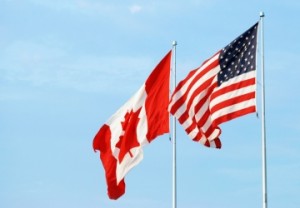As U.S. H-1B Cap is Reached, Skilled Workers Around the World May Look to Canada
 Earlier this month, the United States department of Citizenship and Immigration Services (USCIS) reached the congressionally mandated H-1B cap for the fiscal year. The filing period ended on April 7, 2016.
Earlier this month, the United States department of Citizenship and Immigration Services (USCIS) reached the congressionally mandated H-1B cap for the fiscal year. The filing period ended on April 7, 2016.
USCIS will use a computer-generated process, also known as the lottery, to select at random the petitions needed to meet the caps of 65,000 visas for the general category. USCIS has also received more than the limit of 20,000 H-1B petitions filed under the U.S. advanced degree exemption. Due to the high number of petitions, USCIS has stated that it is not yet able to announce the date it will conduct the random selection process.
U.S. businesses use the highly popular H-1B program to employ foreign workers in occupations that require highly specialized knowledge in fields such as science, engineering and computer programming. Demand for the program typically far outweighs the supply of visas available, and this year is no exception.
Having a back-up plan
Before the lottery is conducted, however, individuals who have made an application for a H1-B visa in the U.S. may explore ‘back-up’ options, in the event that their H1-B application is not drawn. Foremost among these options is Canada.
Not only do the U.S. and Canada share a continent, but also a business-friendly environment and a culture of openness. Both the U.S. and Canada continue to receive hundreds of thousands of newcomers from around the world on an annual basis, with Canada having a per-capita immigration level far higher than the U.S. In addition, Canada welcomes foreign workers through the Temporary Foreign Worker Program (TFWP) and International Mobility Program (IMP).
If an individual obtains Canadian permanent resident status, he or she may become eligible for Canadian citizenship after just four years (this is likely be decreased to just three years in the near future). With Canadian citizenship, a person’s options for working in the U.S. — through programs such as the North American Free Trade Agreement (NAFTA) — become greater.
To research jobs in Canada, use the Canada Job Search Tool.
H1-B holders are strongly positioned to immigrate to Canada
Canada is actually an attractive ‘second’ destination for individuals who first work in the U.S. on a H1-B visa before venturing north to Canada in search of further career and lifestyle opportunities, and it is worthwhile for current and prospective H1-B holders to explore their Canadian immigration and work options. Canadian employers have a history of being attracted to job candidates with North American training and work experience, and H1-B holders are generally in a strong position to take advantage of the various immigration and work programs offered by the government of Canada.
H1-B holders are strongly positioned to have a competitive profile and receive an Invitation to Apply for Canadian permanent residence through Canada's Express Entry immigration selection system. Contrary to the immigration system in the United States, most of Canada's new permanent residents arrive through economic immigration categories that award points for language ability, high levels of education, and skilled work experience, among other factors. Consequently, H1-B holders, as well as other individuals with work or study experience gained in the United States, are typically awarded a high number of points under the Express Entry system.
One major advantage of this system, relative to economic immigration systems used in other jurisdictions, is that the government of Canada aims to process applications within six months.
Provincial Nominee Programs (PNPs)
Canada's immigration policy is more de-centralized than the programs used by the United States. As such, Canadian provinces and territories (roughly analogous to states in the U.S.) can nominate individuals for permanent residence in Canada based on local labour market needs. Many, though not all, PNP streams place an emphasis on obtaining a job offer from a local employer.
As the U.S.’s largest trading partner, Canada is home to a variety of subsidiaries, parent companies, branches, and affiliates of companies that also operate in the U.S. These businesses have the option of bringing in foreign workers to Canada as an intra-company transferee. Transferees must have at least one year of full-time work experience with the foreign enterprise and be coming to Canada to perform comparable work for the Canadian affiliate, either in an executive, senior managerial, or specialized knowledge role. These parameters are often beneficial to H1-B holders who wish to work in Canada without changing employer. Coming to Canada as an intra-company transferee can be a route towards permanent immigration to Canada.
To find out if you are eligible for any of over 60 Canadian immigration programs, please fill out a free online assessment today
Individuals interested in working in Canada temporarily may send an email to wp@canadavisa.com. Please include details of any job offer you may have.
© 2016 CICNews All Rights Reserved
- Do you need Canadian immigration assistance? Contact the Contact Cohen Immigration Law firm by completing our form
- Send us your feedback or your non-legal assistance questions by emailing us at media@canadavisa.com



